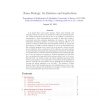Free Online Productivity Tools
i2Speak
i2Symbol
i2OCR
iTex2Img
iWeb2Print
iWeb2Shot
i2Type
iPdf2Split
iPdf2Merge
i2Bopomofo
i2Arabic
i2Style
i2Image
i2PDF
iLatex2Rtf
Sci2ools
115
click to vote
CORR
1998
Springer
1998
Springer
Name Strategy: Its Existence and Implications
It is argued that colour name strategy, object name strategy, and chunking strategy in memory are all aspects of the same general phenomena, called stereotyping, and this in turn is an example of a know-how representation. Such representations are argued to have their origin in a principle called the minimum duplication of resources. For most the subsequent discussions existence of colour name strategy suffices. It is pointed out that the Berlin-Kay universal partial ordering of colours and the frequency of traffic accidents classified by colour are surprisingly similar; a detailed analysis is not carried out as the specific colours recorded are not identical. Some consequences of the existence of a name strategy for the philosophy of language and mathematics are discussed: specifically it is argued that in accounts of truth and meaning it is necessary throughout to use real numbers as opposed to bivalent quantities; and also that the concomitant label associated with sentences sho...
Related Content
| Added | 22 Dec 2010 |
| Updated | 22 Dec 2010 |
| Type | Journal |
| Year | 1998 |
| Where | CORR |
| Authors | Mark D. Roberts |
Comments (0)

